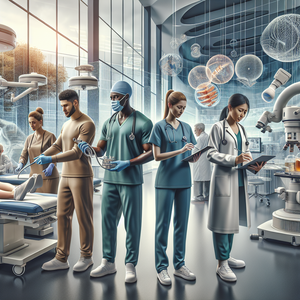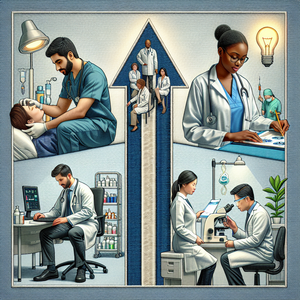
16 In-Demand Careers in Allied Health: Job Overview, Requirements, and Future Prospects
The allied health sector plays a crucial role in the healthcare system, offering diverse career paths that cater to a variety of interests and skills. With a growing aging population and increasingly complex healthcare needs, the demand for allied health professionals is on the rise. This article delves into 16 in-demand careers in allied health, detailing the responsibilities associated with each role, educational and certification prerequisites, and their overall impact on patient care and the healthcare landscape.
Job Summaries:
Sonographer:
- Sonographers utilize ultrasound technology to create images of internal body structures, aiding in the diagnosis of various medical conditions.
- An associate degree in diagnostic medical sonography is generally required, along with certification from the American Registry for Diagnostic Medical Sonography (ARDMS).
- Key skills include technical proficiency, attention to detail, and effective patient communication.
- As vital members of the healthcare team, sonographers ensure accurate imaging services.
Phlebotomist:
- Tasked with drawing blood for tests, donations, and transfusions.
- Phlebotomists typically need a high school diploma and completion of a phlebotomy training program, which can be achieved in a few months.
- Certification may be required depending on state regulations.
- Strong interpersonal skills are essential as phlebotomists often work with patients who may feel anxious.
Medical Assistant:
- Medical assistants play a dual role, performing administrative and clinical tasks in healthcare settings.
- Generally, a diploma or certificate from a medical assisting program is required.
- Responsibilities can include scheduling appointments, taking patient histories, and managing medical records.
- Important skills for this role include attention to detail, multitasking, and strong organizational abilities.
Health Information Technician:
- These professionals manage and organize health data, ensuring its accuracy and confidentiality.
- A degree in health information technology or a related field is often needed, along with certification as a Registered Health Information Technician (RHIT).
- Their work involves handling electronic health records (EHRs) and coding medical data.
Dietitian:
- Dietitians evaluate patients' nutritional needs and craft personalized dietary plans to enhance health and manage conditions.
- A bachelor's degree in dietetics or a related field is required.
- Completion of a supervised practice program is necessary.
- Passing a national exam is required to become a Registered Dietitian Nutritionist (RDN).
- Communication and counseling skills are vital for guiding patients in their dietary choices.
Radiologic Technologist:
- These specialists perform diagnostic imaging tests such as X-rays and CT scans.
- They assist healthcare providers in identifying medical conditions.
- An associate degree in radiologic technology is typically required.
- Certification from the American Registry of Radiologic Technologists (ARRT) is typically required.
Respiratory Therapist:
- These professionals assess and treat patients with respiratory or cardiopulmonary disorders.
- Typically, an associate or bachelor’s degree in respiratory therapy is required, along with state licensure.
- Duties include administering oxygen therapy and educating patients about their conditions.
Surgical Technician:
- Surgical technicians prepare operating rooms.
- Sterilize instruments.
- Support surgeons and nurses during procedures.
- A diploma or associate degree in surgical technology is usually required.
- Relevant certification is also needed.
Medical Laboratory Technician:
- These technicians conduct tests on blood, urine, and other bodily fluids to assist in disease diagnosis.
- An associate degree in clinical laboratory science and certification from a recognized organization are typically required.
Occupational Therapist:
- Occupational therapists aid patients in developing and improving daily living skills.
- A master's degree in occupational therapy and state licensure are required.
- Therapists assess patient needs and develop individualized treatment plans.
Pharmacy Technician:
- These technicians assist pharmacists in dispensing medications and managing pharmacy operations.
- A high school diploma and completion of a pharmacy technician training program are typically required.
- Certification in some states is also required.
Dental Hygienist:
- Focused on preventive oral care
- Dental hygienists clean teeth
- Examine patients for oral diseases
- Educate patients about proper dental hygiene
- An associate degree in dental hygiene is required
- State licensure is required
Physical Therapist:
- Physical therapists help patients regain mobility and manage pain post-injury or surgery.
- A doctoral degree in physical therapy and state licensure are required.
- They create personalized rehabilitation plans tailored to individual patient needs.
Cardiovascular Technologist:
- These technologists assist in diagnosing and treating heart and blood vessel conditions.
- An associate degree in cardiovascular technology is typically required, along with certification.
Medical Coder:
- Medical coders translate healthcare services into standardized codes for billing and insurance purposes.
- A high school diploma and completion of a medical coding training program are usually necessary.
- Certification is typically required.
Genetic Counselor:
- Genetic counselors evaluate patients’ genetic risks.
- They provide guidance on testing options.
- A master’s degree in genetic counseling is required.
- Certification is required.
By exploring these varied roles, individuals interested in allied health can find fulfilling careers that align with their skills and aspirations while making meaningful contributions to the healthcare system. As healthcare demands continue to grow, pursuing a career in allied health presents an opportunity for a rewarding and impactful professional journey.
Explore More Jobs

